- Home
- Jim Fergus
Strongheart: The Lost Journals of May Dodd and Molly McGill Page 29
Strongheart: The Lost Journals of May Dodd and Molly McGill Read online
Page 29
“Trust me, JW, it’s best that way … for now. By the way, I brought part of the journals you’ve been pestering me about with me this time.”
I picked up my leather saddlebags that I had left inside the door of the trailer when I arrived, those that had belonged to the soldier boy Miller, who died with Custer and his 7th cavalry at the Little Bighorn. I pulled out a bundle of several ledger books and part of my manuscript, all bound together with a leather thong. “I want you to read the original of these, then what I’ve done with them, JW, and tell me what you think about my editing job. You will learn things you don’t know, that your father didn’t know. His research was incomplete, through no fault of his own. You will be surprised.”
“Thank you, Molly,” he said, taking the bundle reverently in hand. “What made you change your mind about showing them to me?”
“I got thinking about what you said, that we shared them in a way, due to our respective ancestors, and I realized that maybe you’re right. So, to get back to our original conversation, what did you want me to ask you about yourself?”
He laughed then. “I don’t know, Molly … it doesn’t really matter, does it?… Anything … you know, just the basic things people ask to get to know each other better.”
“OK, I can do that,” I said. “So, why are you still here? On the res? You’ve been hanging around for what … six, seven weeks now? Did you quit your job? Sell the family magazine? Who’s running the business?”
“I took a leave of absence. I left one of my editors in charge.”
“Why?”
“That’s a good question, Molly, but I’m not sure I have a good answer,” he said. “I’ve been feeling all this time like I have unfinished business here … but I haven’t quite figured out what that is.” He held up the bundle. “Maybe this is the reason.” He shrugged and smiled. “And I feel like you and I have unfinished business, too.”
“Like what kind of business?”
He laughed again. “Like getting to know each other. You come by here at strange hours, spend the night with me, we share sexual intimacies … Then you disappear again, until the next time. And so I guess I’ve been waiting around for that next time, without ever knowing if it was going to come. But I never expected you’d bring these to me.”
“When you read them, JW,” I said, “the pieces will begin to fit, you’ll understand more about why you’re still here.”
“That’s good to know, Molly. Can you give me a hint before I start reading?”
“You remember when we were kids?” I asked. “You were the first white boy I ever met, and we liked each other right away, even though we’re of different races and have completely different backgrounds. You were a little rich white kid from Chicago whose family owned a fancy magazine, of which your dad was the publisher. You went to a good school with other rich white kids, got a good education, played sports … like golf and tennis … all those things rich white kids do. If you had been someone else, I probably would have hated you, resented you like some of the res boys did … I may even have helped them beat you up. I was an angry girl, and I’m an angry woman. But I liked you right off, because you didn’t come across as a privileged rich kid, you didn’t act superior to us poor, alcoholic, uneducated savages who live in this third-world country most Americans know nothing about and don’t want to know anything about, even though it’s within the borders of your giant, rich country, and they should pay attention.”
“I liked you right off, too, Molly,” JW said, “and I didn’t think of you as an inferior, poor, alcoholic, uneducated savage.”
“Gee, JW, that’s the nicest thing you’ve ever said to me.”
“So what’s the hint you were going to give me?”
“That’s it, you’ll know when you read the journals. That’s when I realized the main reason we liked each other from the beginning, and were still attracted to each other after twenty years.” I placed my hand on the bundle in his lap. “These are what brought us together here as kids, and now as adults. You see, despite the fact that we’re of different races, and from different worlds, as you pointed out, we have a common ancestral link.”
“I thought you told me we weren’t related?”
“Not by blood, but we each have ancestors who knew each other … who were friends. And right here,” I said, patting the bundle, “we have a historical record of that, written in their own hand.” I could see the gooseflesh rising on JW’s arms, and the blood to his face. “Read them.”
“I’m going to do that right now … if it takes me all night.”
“Good, I’m going to bed,” I said … “Don’t you want to come keep me company for a little while … you know, help me get to sleep?”
He looked at me with a smile. “Well, as long as you ask, Molly, and being the altruistic fellow that I am, I suppose I could help you out with that.”
“Wow, yeah, what a guy…”
* * *
I woke up in the trailer the next morning to the scent of coffee brewing in the French press JW uses. He has a propane stove on which he heats the water, but no electricity out here. I think often of the fact that coffee was such a luxury to my ancestors, introduced to them by the first French traders who came down from Canada. Perhaps that was the beginning of our seduction by the worldly goods of the whites … but of course, there was also the tobacco they brought us, the beads and trinkets and blankets … the list goes on and on, and has resulted today in an epidemic of diabetes on the reservations … it’s so much easier for the whites to kill us now, all they have to do is feed us their crappy junk food, which is killing them, too.
When he saw that I was awake, JW poured me a cup, brought it to me, and his own, and sat down on the edge of the bed. He has two couches in his rig, one in the front, just inside the door, and the other in the back, both of which fold out into beds. He keeps the one in the back folded down so he doesn’t have to make the bed every day. He told me that when he was a kid his dad slept back here and he slept up front. I liked his trailer, it had the same kind of rounded coziness as a tipi lodge.
We sat in silence for a while, drinking our coffee and just looking at each other. I had the sense that something had changed between us overnight, and clearly as a result of the journals.
“Well?” I finally asked.
“That’s our ancestral link, isn’t it?” he said. “May Dodd didn’t die in the cave, after all … she and Molly McGill knew each other, your ancestor and mine were friends … competitors, too, in a way, because they were both alpha women, but mostly friends. And that’s why we liked each other as children, and again as soon as you came to my office, even though I didn’t even recognize you at first.”
“Yes, I believe that it’s a kind of genetic memory, passed down through the generations. The same chemical, neurological qualities that made them like and respect each other were manifest in us.”
He smiled at me in a gentle way. “I don’t know about those things, Molly,” he said, “but it’s an interesting theory, and if it works for you, by all means, count me in. What I need to know now is what really happened to May. I see that you’re right, my father had incomplete information. But Brother Anthony’s testimony of her death seemed unquestionable, and he was the only person to have seen her at the end … except it wasn’t the end, was it? One thing for certain, it is her handwriting in these journals. I’ve read the original batch, dozens of times since they came into my father’s possession. He had them, and the letter she wrote to her children, professionally authenticated by a forensic handwriting expert. I would do the same with these if you allowed me to, but I’m familiar enough with her style by now to recognize that they’re the real thing.
“So are you holding out on me, Molly? Why won’t you show me the rest of the journals? Do you know what happened to May, when and where she really died?”
“I’ll bring the rest the next time I come, JW, after I’ve finished my own work. They’re in a safe place.”
> “You’re not answering my question,” he said.
“That’s because it’s not a question I’m capable of answering. You have to trust me about that. You’ll have to come to your own conclusions after you’ve read them.”
“So why didn’t you just bring all of them this time, and let me do that?” he asked.
“I’ll tell you why, JW … because you’re a journalist and this is a story about your family. I was afraid that if I brought all the ledger books, and you read them, you would leave here, go back to Chicago, and write your own story.”
He laughed. “You really think I would try to steal these from you, Molly, is that what you’re saying?”
“Not steal exactly … I know you’re too honorable to do that, and if you tried, you know how handy I am with a knife. But journalists are journalists, and a story is a story. It’s like you said to me once, ‘It’s my job.’”
At this he smiled and nodded. “You’re right about the knife part,” he said. “I wouldn’t dare try to take anything from you that wasn’t offered.”
“The other thing is…” I started to say … and then I got embarrassed. “Never mind…”
“Ah, no, that doesn’t work, Molly. What were you going to say?”
“OK … I was going to say that for personal reasons, I was afraid you were going to leave here, and I didn’t know when or if you would be back. I’m never coming to Chicago again. I loathe the white man’s cities, and you would have no way to find me if you did come back. I do dangerous work, JW, and, like you said, we have unfinished business, you and I. As long as we’re here together, we may as well try to finish it.”
“That sounds good to me, Molly,” he said, “but let’s not talk about business for a while. Do you remember when we were kids, and we finally got away from the boys you were always hanging out with. You were a real tomboy, and the leader of the pack. Dad was off somewhere on the res, and you and I came here to the trailer together. I made sandwiches for us … bologna sandwiches on white bread for a picnic, you remember?”
I laughed. “Of course I remember. How could I forget those revolting white-man sandwiches? You put so much mayonnaise on them that when I took my first bite, the bologna squirted out the back of the bread.”
“Yes, I remember that,” he said, laughing. “It’s true, they were a little slippery. But that was early in my culinary career. I’m a much better cook now. Why don’t you stay here with me for a few days? I was thinking I could make us a little picnic today … I promise it won’t be bologna. We’ll go fishing like we did that one time, after we finally got away from your entourage of boys. We’ll take our picnic and my fishing gear and walk up the river. We could even camp out for the night, I’ve got everything we need in the trailer. I could cook trout for our dinner.”
“That sounds like a fine idea, JW,” I answered. “But I can’t leave my horse tied up here. I’d have to ride him. What are you going to do, walk along beside me?”
“I’ve been thinking about that … could you get another horse for me?” he asked. “I haven’t ridden for a while, but I’d like to again, and I brought my old cowboy boots with me. Dad kept horses on our farm in Libertyville outside Chicago, but I sold them after he died.”
“I stable my horse with a woman friend who raises them here on the res. Are you willing to pay to rent one for a few days? She needs the money, and we could put you on a nice gentle horse for greenhorns.”
He laughed at this. “I’d be happy to rent one from her … but I’ve ridden most of my life, so I’m not that much of a greenhorn.”
It was decided that we would drive JW’s Suburban over to my friend Lily Redbird’s ranch. She’s a single mom with three children, having kicked her alcoholic, abusive husband out three years ago. Luckily the ranch belonged to her family and not his. She raises and trains mustangs there, which she sells to white ranchers in Montana and Wyoming. Her horses are much prized as cow ponies, and because they come from native stock, they are uniquely hearty and well adapted to the severe winters in this country. Still, it’s not an easy way for a woman alone with three kids to make a living.
Lily was in her corral working horses when we arrived. She’s a proud, handsome woman in her midthirties, dark-skinned and with the kind of strong distinctive features of the old-time Plains Indians you see in the photos of Edward Curtis and L. A. Huffman, before our blood was diluted by intermarriage with whites, poor diet, alcohol abuse, and historical trauma. She and I spoke together mostly in Cheyenne, and after I introduced her to JW, I explained that he was the son of the man J. Will Dodd, with whom most people on the reservation were familiar, at least by reputation. She nodded in recognition of the name, though she still eyed JW with some suspicion, partly I think because she was so surprised to see me with a man … and a white man at that. I asked her about renting one of her horses and tack for a few days.
Lily turned to JW and addressed him directly in English. “Why don’t you just buy one of my horses, Mr. Dodd,” she asked him, “rather than wasting your money on rent?”
“Because I live in Chicago, Ms. Redbird,” he answered, “and it would be complicated for me to bring a horse back there.”
“Well, you see, I really don’t like to rent my horses … especially to people I don’t know. This is a working ranch, not a dude ranch.”
JW smiled at her directness. “I’m not really a dude, ma’am,” he answered.
She narrowed her eyes appraisingly. Lily is a good businesswoman and accustomed to dealing with white ranchers. “I’ll tell you what I will do, Mr. Dodd,” she said. “I will give you a good deal on a well-trained mustang, and I’ll fix you up with used tack at a fair price. I have just the horse in mind for you. He’s a barrel racer, has won a few competitions, knows how to work cattle—a good, steady gelding, and gentle as a kitten. I don’t even have to use a bit on him, just a hackamore.”
“I don’t believe I’ll be doing much barrel racing, Ms. Redbird,” JW said, “or working of cattle. And I still have the issue of living in Chicago.”
“I was just getting to that part, Mr. Dodd,” Lily said. “See, you don’t need to take him back to Chicago. I’d be willing to board him for you right here, and keep him in good shape. That way, whenever you come out, you’ll have your own horse to ride. And you won’t have to worry about finding one to rent, because no one on the res is going to rent you a horse and tack”—she smiled—“including me.”
JW laughed at her attitude. “So I buy a horse from you, Ms. Redbird,” he said, “and I pay you to board him all year, so I can ride him if I come out here for my two-week summer vacation.”
“Exactly right, sir,” she said.
“And what are we talking about in terms of price?”
“The mustang will cost you one thousand dollars,” Lily answered, “which is a great bargain for a fully trained animal. The tack will cost you about five hundred, just to keep things rounded. And I’ll make you a real good deal on the boarding … one hundred dollars a month. And you pay the first year in advance.”
JW looked over at me with an amused, quizzical expression. Having lost pretty much everything we ever had to the rapacious white man, people on the res tend to enjoy the opportunity to stick it to him when the rare occasion presents itself. To his credit, JW turned back to Lily. “Alright, Ms. Redbird,” he said, “it’s a deal, with one stipulation. I’ll put a cash deposit down on the horse right now, after you show him to me, of course. And you fix me up with tack, so I can ride him today. On Monday, I’ll drive to the bank in Billings and bring you the rest of the funds upon my return.”
“In cash,” Lily said, and not as a question, but as a statement of fact.
“Yes, ma’am,” he said, smiling and shaking his head in amusement, “cash it will be.”
“Let’s go look at your mustang, Mr. Dodd, and if he pleases you, we’ll shake on it.”
“Please call me JW, Ms. Redbird. Mr. Dodd was my father.”
“Very well, J
W, and you call me Lily.”
The gelding was a handsome little buckskin, solidly built and with a good head. JW looked him over and ran his hands on him, picked up his legs and looked at his hooves, like he actually knew what he was doing. “Yes, he’ll do very nicely, Lily,” he said, and they shook hands. “Does he have a name?”
“Indian,” she said with a smile. “I’ll go pick out some tack for you, JW. One of my sons and I will come back with it, saddle you up, and you’ll be on your way.”
As Lily walked back toward the barn, JW turned to me and said, “That’s the most expensive rental horse I’ve ever heard of. Did you know this was going to happen, Molly?”
“Sure I did,” I said with a smile. “Lily and I are old friends, we went to school together, got abused by the same priest in the basement. She’s a Strongheart woman. We take care of each other. By the way, you behaved like a gentleman, JW. I was proud of you for accepting her terms. She works hard for her money. It’s not easy making a living on the res.”
“Well, now that I own a horse,” he said, “it looks like I’ll be spending more time out here.”
“That’s what I was hoping for. I’m glad you had the idea.”
I suggested to JW that I ride his new horse back to the trailer, and that he drive the Suburban. I knew a shortcut through private property that was faster and safer than following the highway, and, most importantly, I had permission from the owners. Also, although by now virtually everyone on the res knew that the son of J. Will Dodd was camped in his trailer down by the creek, he could still run into the wrong men, who might take exception to a white man riding his horse across sovereign territory, which would be a largely unprecedented event.
Because he arrived back at the Airstream well before I did, JW had already prepared our picnic and organized his camping and fishing gear for our outing. I had arranged for Lily to include a small set of used canvas pack panniers in the tack she sold him, for which, always the businesswoman, she insisted he pay an additional $50.

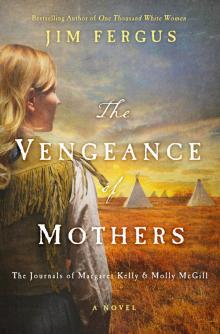 La Vengeance des mères
La Vengeance des mères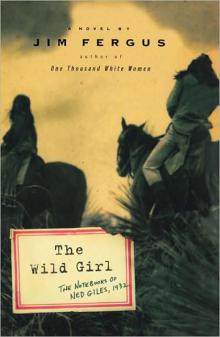 The Wild Girl: The Notebooks of Ned Giles, 1932
The Wild Girl: The Notebooks of Ned Giles, 1932 One Thousand White Women
One Thousand White Women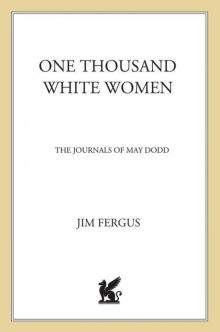 One Thousand White Women: The Journals of May Dodd
One Thousand White Women: The Journals of May Dodd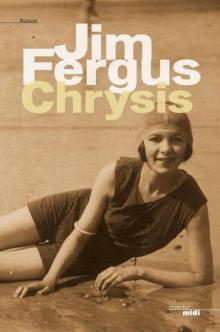 Chrysis
Chrysis Strongheart: The Lost Journals of May Dodd and Molly McGill
Strongheart: The Lost Journals of May Dodd and Molly McGill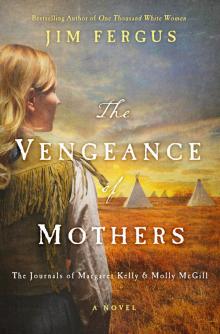 The Vengeance of Mothers
The Vengeance of Mothers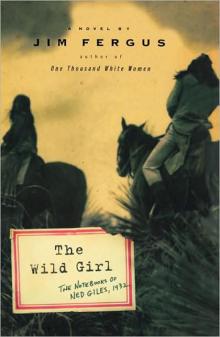 The Wild Girl
The Wild Girl